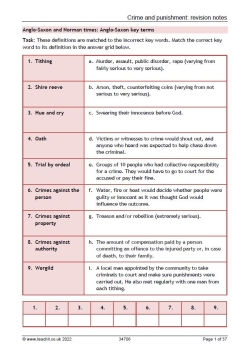Crime and punishment: revision notes

This 37-page booklet is intended for revision of Edexcel’s Crime and Punishment unit, c.1000 to the Present Day, but it can also support delivery of other exam boards’ similar units (which can cover other time frames). The final section on the historic environment is specific to the Edexcel unit.
What's included?
The resource includes two versions of the same content to allow for teacher flexibility. The first version includes key term matching activities, gap fills and sorting tasks. The answers serve as a second version in case teachers would prefer to give the information directly to students in the form of a knowledge organiser.
The topics covered are as follows:
- Anglo-Saxon and Norman times
- Middle Ages: role of the Church
- Early modern times: criminal activity, and poverty and enforcement
- Industrial Britain: criminal activity, prisons and punishment, and policiing
- Modern Britain: criminal activity, punishment, and policing
- Whitechapel, c.1870–c.1900: historic environment.
Looking for more like this?
Browse the Crime and Punishment collection for more revision resources, worksheets, lessons and more.
An extract from the knowledge organiser:
Early modern times: criminal activity key terms
|
High treason |
The crime of plotting or acting to overthrow or harm the ruler or country. |
|
Heresy |
The crime of having religious beliefs that were different to the official religion of the country. |
|
Vagabondage or vagrancy |
Being an unemployed or a homeless person; these people were often hated or feared by the public. |
|
Smuggling |
Bringing goods into the country secretly to avoid paying import tax. This normally also involved then selling the goods on for a profit. |
|
Bloody Code |
The period from 1688 to 1825, so named because of the increase in capital offences. In 1688 there were 50 capital offences to frighten people. |
